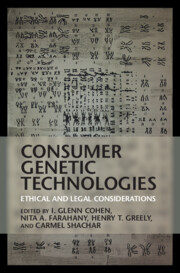Book contents
- Consumer Genetic Technologies
- Consumer Genetic Technologies
- Copyright page
- Contents
- Contributors
- Acknowledgments
- Introduction
- Part I Consumer Genetic Technologies: Rights, Liabilities, and Other Obligations
- Introduction to Part I
- 1 Liability Implications of Direct-to-Consumer Genetic Testing
- 2 Consuming Genetics As a Life Insurance Consumer
- 3 In Favor of an Action for Genetic Conversion
- 4 Direct-to-Consumer Genomics and Personal Health Data
- 5 Governance in the Era of CRISPR and DIY-Bio
- Part II Privacy in the Age of Consumer Genetics
- Part III Tinkering with Ourselves: The Law and Ethics of DIY Genomics
- Part IV Consumer Genetics and Identity
- Part V The Impact of Genetic Information
1 - Liability Implications of Direct-to-Consumer Genetic Testing
from Part I - Consumer Genetic Technologies: Rights, Liabilities, and Other Obligations
Published online by Cambridge University Press: 27 August 2021
- Consumer Genetic Technologies
- Consumer Genetic Technologies
- Copyright page
- Contents
- Contributors
- Acknowledgments
- Introduction
- Part I Consumer Genetic Technologies: Rights, Liabilities, and Other Obligations
- Introduction to Part I
- 1 Liability Implications of Direct-to-Consumer Genetic Testing
- 2 Consuming Genetics As a Life Insurance Consumer
- 3 In Favor of an Action for Genetic Conversion
- 4 Direct-to-Consumer Genomics and Personal Health Data
- 5 Governance in the Era of CRISPR and DIY-Bio
- Part II Privacy in the Age of Consumer Genetics
- Part III Tinkering with Ourselves: The Law and Ethics of DIY Genomics
- Part IV Consumer Genetics and Identity
- Part V The Impact of Genetic Information
Summary
Direct-to-consumer (DTC) genetic testing has raised questions about the accuracy of the test results, which may raise potential novel liability issues. This chapter examines potential liability exposures relating to DTC genetic testing in two main contexts. The first is potential liability for the DTC provider itself for erroneous results. Key issues in such cases will be the validity and effect of the representations and disclosures that the DTC company provides, which often informs the consumer that the results should not be relied on for medical care, disclaim any liability for any harms that may result from such reliance, and require any disputes to be resolved by mandatary arbitration. The second potential type of case is against health care providers who are presented with DTC results by their patients. Providers will often be put in a “damned if they do, damned if they don’t” predicament by such results, as both ignoring or relying on the DTC test results could create potential liabilities in certain situations. While providers can usually protect themselves by requiring validation of the DTC results by an independent laboratory, time and economic constraints may make this infeasible in some cases.
- Type
- Chapter
- Information
- Consumer Genetic TechnologiesEthical and Legal Considerations, pp. 15 - 25Publisher: Cambridge University PressPrint publication year: 2021
- 1
- Cited by



